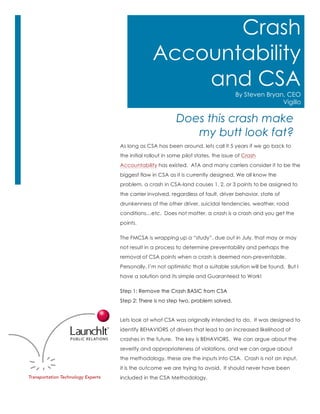Does This Crash Make My Butt Look Fat?
- 1. As long as CSA has been around, lets call it 5 years if we go back to the initial rollout in some pilot states, the issue of Crash Accountability has existed. ATA and many carriers consider it to be the biggest flaw in CSA as it is currently designed. We all know the problem, a crash in CSA-land causes 1, 2, or 3 points to be assigned to the carrier involved, regardless of fault, driver behavior, state of drunkenness of the other driver, suicidal tendencies, weather, road conditionsŌĆ”etc. Does not matter, a crash is a crash and you get the points. The FMCSA is wrapping up a ŌĆ£studyŌĆØ, due out in July, that may or may not result in a process to determine preventability and perhaps the removal of CSA points when a crash is deemed non-preventable. Personally, IŌĆÖm not optimistic that a suitable solution will be found. But I have a solution and its simple and Guaranteed to Work! Step 1: Remove the Crash BASIC from CSA Step 2: There is no step two, problem solved. Lets look at what CSA was originally intended to do. It was designed to identify BEHAVIORS of drivers that lead to an increased likelihood of crashes in the future. The key is BEHAVIORS. We can argue about the severity and appropriateness of violations, and we can argue about the methodology, these are the inputs into CSA. Crash is not an input, it is the outcome we are trying to avoid. It should never have been included in the CSA Methodology. Does this crash make my butt look fat? Crash Accountability and CSA By Steven Bryan, CEO Vigillo
- 2. 2 ŌĆ£ItŌĆÖs just not necessary, or appropriate to include crashes as an input into the CSA methodology.ŌĆØ Think of it this way, letŌĆÖs design a diet program whose goal is to reduce obesity. Obesity is the parallel to crash, it is the undesirable outcome we are going to try and avoid by changing the behaviors that lead to it. So weŌĆÖre going to create categories of kinds of behaviors that lead to obesity, weŌĆÖll call these BAFICs (Behavioral Analysis Fat Improvement Categories) There are six of them as follows: Diet, Exercise, Stress, Lifestyle, Drug & Alcohol, Residence. All of these categories can be scientifically proven to have a direct influence on the likelihood that a person will be obese, and all of these are controllable by the individual and weŌĆÖll issue violations as a part of our diet program to incentivize people to avoid these risky behaviors. So far so good, sounds just like CSA, with one exception. We are NOT going to look at a person, declare them fat, and issue points for it. Being fat is not a behavior to control or penalize. It is the undesirable outcome we wish to avoid by changing behaviors that matter. But surely we canŌĆÖt ignore crashes?! No, of course not. Crashes should still be closely scrutinized, both by the carrier and the FMCSA. ItŌĆÖs just not necessary, or appropriate to include crashes as an input into the CSA methodology. A crash is not a behavior that can be changed, it is the output, the result, of a pattern of risky behaviors that tend to lead to crashes. Going out in public and pointing at fat people and shouting, ŌĆ£hey fatty, you should lose weightŌĆØ will not result in weight loss. Eliminate the Crash BASIC, treat it like the ISS score, it can inform law enforcement to give more or less scrutiny to carriers, but get it out of the CSA methodology. Problem solved, now lets focus on the nonsensical construction of the Driver Fitness, Controlled Substance and HAZMAT BASICs to get focused on changing the risky driver behavior that matters. It will actually reduce crashes. For more information about how you can manage your CSA scores, contact LaunchIt at info@LaunchItPR.com.


